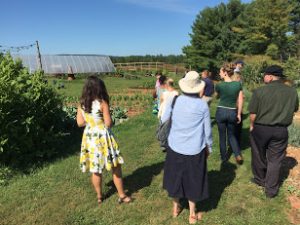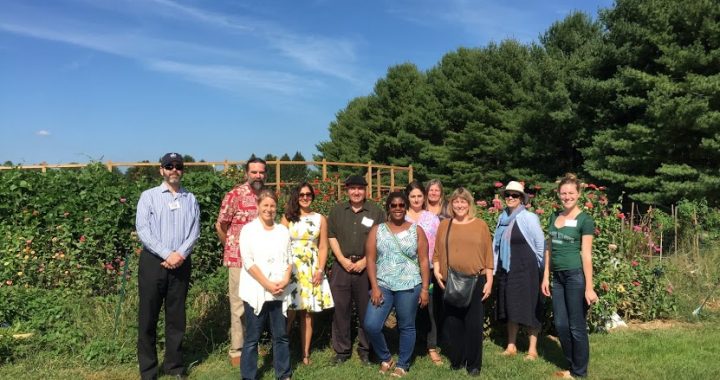by Tom Wood, SCI-Chesapeake Bay Co-Director, George Mason University
On September 24, the Chesapeake Bay SENCER Center for Innovation held a day-long workshop focused on sustainable food production at the Airlie Conference Center in Warrenton, Virginia. Like many campuses across the country, the Chesapeake regional campuses have noted, and responded to, an increased public awareness concerning responsible food production. Innovative learning environments are emerging to integrate food security and social responsibility as well as modern crop and livestock production, regulatory environments, transportation and economics.
Once primarily taught in our Land Grant institutions, food production is becoming more important in the curriculum of sustainability majors, pre-service teachers and non-agricultural majors in all institutions of higher education. Our Chesapeake regional institutions have identified synergistic goals linking modern science and engineering practice with cultural values and ethical practice. We are enthusiastic to promote SENCER goals through cultural and ethical demand for responsible food production and STEM innovation.

SCI-Chesapeake Bay meeting participants tour organic food garden
Six regional universities were represented in this exciting new initiative, and a high level of awareness about our common goals became immediately apparent. Each university presented a summary of existing programs in their institution. The group discussion that followed revealed synergistic goals and possibilities of regional collaboration and mutual support through our SENCER network. Participants were able to tour the organic food garden at Airlie and generate ideas about involving students in food production from farm to table. At the conclusion of the workshop, individual participants were granted small implementation awards to develop new modules or courses around themes that emerged in the workshop. Overall, enthusiasm for the day was high, and new developments will emerge at future SENCER meetings.
Existing programs provide a strong foundation for collaboration and development of SENCER ideals. For example, at the University of Maryland, Edgar Moctezuma’s course “Amazing Green: The plants that transformed the world,” the importance of plants in our culture, history, economy and society as a whole is addressed. Dr. Moctezuma is working with colleague Michelle Nelson in the Terp Community Garden and other colleagues to promote healthy eating, and even cooking skills across the community. Steven Gable, Mahshid Khavari, and Diana Watts from Trinity University are continuing to develop their Environmental Science degree program, using SENCER ideals within each course they create. They are incorporating math, business and philosophy into their courses that explore the impact of sustainable agriculture on equitable access to healthy foods and responsible use of sustainable resources, including water. Exciting initiatives are emerging from George Mason University, where the BA degree in Sustainability supports extensive experiential learning and Kerri Lacharite is developing learning environments focused on sustainable food production. At James Madison University, Cindy Klevickis is educating future teachers about the values of sustainable food production in the Chesapeake watershed. These are a few examples of the exciting opportunities a SENCER approach will build upon, producing learning environments with an interdisciplinary approach to an extensive societal issue.
Following up on this regional workshop, the Chesapeake Regional Center for Innovation would like to continue collectively developing progressive learning environments focused on responsible food production. We invite other SENCER institutions to join in this theme, and look forward to presenting findings at future Summer Institutes and regional meetings.
Photos courtesy of Dr. Tom Wood

